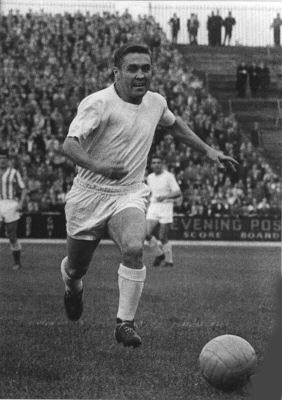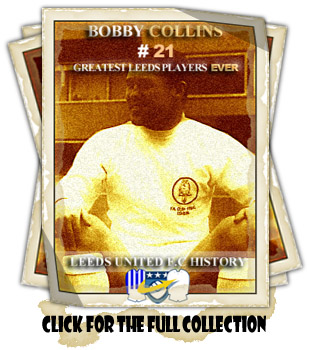

Collins: Robert Young (Bobby)
1962-1967
(Player Details)
Inside Forward
Born: Govinhill, Glasgow: 16-02-1931
Debut v Swansea Town (h): 10-03-1962
5’4” 10st 3lb (1963)
#21 in 100 Greatest LUFC Players Ever

He joined Glasgow Celtic on 27th August 1948 after playing for Polmadie Street School in
Glasgow, Polmadie Hawthorns and Glasgow Pollok. The eldest of six children, he supported his
local club, Third Lanark, as a boy and when Everton offered Pollok a transfer fee of £1,000
the seventeen year-old agreed to the deal but as soon as Celtic offered him £8 per week he
quickly changed his mind and signed part-time terms for the hoops. He made his debut on 13th
August 1949 in the Scottish League Cup as Celtic edged out Rangers 3-2 at Parkhead. There was
71,000 on hand to see the teenage Collins torment the Rangers veteran left-back Jock Shaw. He
soon became an automatic choice and got his first goal when he playing at Inside Right on 17th
September 1949 when he got the winner just before the end as Celtic beat Hearts 3-2 at Parkhead.
Collins' outstanding club form caught the eye of the Scotland selectors and he was called up
to the full international squad in the autumn of 1950. Injury forced his withdrawal from a
fixture with Switzerland, but he made his full debut soon afterwards, at Ninian Park, Cardiff
on 21st October 1950 in a 3-1 win over Wales in which Collins laid on a cross for Billy Liddell
to head a spectacular goal. He retained his place for home matches at Hampden Park, with
Northern Ireland on 1st November 1950, in a 6-1 triumph, with Billy Steel scoring four and
Billy McPhail two, and then on 13th December 1950 against Austria, where a 1-0 defeat saw
Scotland become the first home international nation to lose on their own turf to overseas
opposition. The setback prompted a radical rebuilding programme, and it was four and a half
years before Collins regained a place in the Scottish team. Collins steadily accumulated medals
and made records, and doubled his Scottish caps as he was recalled to the international team
with three games in a fortnight, as Scotland drew 2-2 away to Yugoslavia on 15th May 1955, at
the Red Star Stadium, Belgrade, and then got retribution for the defeat by Austria by winning
4-1 at the Prater Stadium, Vienna, four days later, but on 29th May 1955 they went down 3-1 at
the Nep Stadium in Budapest against Hungary. He was recalled for the Home Championship games
against Northern Ireland at Windsor Park, Belfast, on 8th October 1955, which the home team
won 2-1, and a month later on 9th November they defeated Wales 2-0 at Hampden Park. He was
selected for the fixture with Wales the following season as the sides fought out a 2-2 draw at
Ninian Park, Cardiff, on 20th October 1956. There was a home international loss by 1-2 to England
at Wembley, on 6th April 1957. He next appeared for Scotland in the 1958 World Cup qualifiers on
8th May 1957 as a Jackie Mudie hat-trick and a John Hewie penalty saw Scotland beat Spain 4-2 at
Hampden Park, and then Collins got his first goal for Scotland as they won 2-1 in Basel to
overcome Switzerland and then he scored two more in a friendly against West Germany in Stuttgart
as Scotland won 3-1 on 22nd May 1957. This was followed by a 4-1 loss to Spain, at the Bernabeu
in Madrid on 26th May 1957, which was was a jolt to their World Cup aspirations. There was then
a home international, on 5th October 1957 in a 1-1 draw with Northern Ireland at Windsor Park,
Belfast. They were back on track in the World Cup qualifiers with a 3-2 home win over Switzerland
at Hampden Park on 6th November 1957, followed by his fourth international goal in a 1-1 draw
with Wales at Hampden Park on 13th November 1957. He gained two more caps, in a 1-1 draw with
Hungary on 7th May 1958 at Hampden Park and two more goals as he scored both goals in a 2-1 win
over Poland at the Stadion Dziesieciolecia, Warsaw, on 1st June 1958, to bring his goals to six.
Three more appearances in the World Cup in Sweden, which saw a 1-1 draw with Yugoslavia at
Arosvallen Vasteras, on 8th June 1958, three days later he scored against Paraguay at
Idrottsparken, Norrkoping, to make his total seven goals, in a 2-3 loss, and on 15th June 1958 the
Scots finished a miserable World Cup beaten 2-1 by France at Eyravallen Orebro, to take his
tally to seven in twenty-two games while at Parkhead. In ten years at Celtic Park he won a
Scottish League Champions Medal in 1954, Scottish Cup-Winners Medals in 1951 and 1955, Scottish
League Cup-Winner’s Medals in 1957 and 1958, represented the Scottish League on sixteen occasions
and was one of the very few players to score a hat-trick of penalties, against Aberdeen in
September 1953. After scoring eighty goals in two hundred and twenty Scottish League games, he
was sold to Everton on 12th September 1958 for £23,000. Collins was not happy with the transfer,
and the reason was never made public, but the club possibly sold him for financial reasons to
fund the new floodlights system! Although his arrival at Everton sparked a revival, he was the
subject of petty jealousy and poison pen letters despite giving them some good service. His
international career continued as his form was maintained at Goodison. He added two goals to
bring his tally to nine as he scored in the home internationals with Wales as Scotland won
3-0 at Ninian Park, Cardiff on 18th October 1958 and also in the 2-2 draw with Northern
Ireland at Hampden Park on 5th November 1958. He played in the home international with England
at Wembley on 11th April 1959 when the home team won 1-0 and then there were three more caps
in the 1959 close season, on 6th May 1959, as Scotland beat West Germany 3-2 at Hampden Park,
then on 27th May, when he scored his tenth and final goal in a 2-1 win over Holland at the
Olympic Stadium Amsterdam, and on 3rd June 1959 as Scotland went down to Portugal in his
twenty-eighth international game. Those were the final Caps he got while at Everton. It
seemed like they would be his last, as, after he had scored forty-two goals in one hundred
and thirty-three League games at Goodison Park, he joined Leeds United and it was thought his
career was almost over. Although he was small in stature, he was huge in standing amongst
United’s galaxy of greats, and Bobby Collins was the platform on which Don Revie launched his
great sides. Revie paid £25,000 to Everton in March 1962 for the thirty-one-year-old
ex-Scotland International, who went on to lift a mediocre club out of the depths of the
Second Division to one of the most respected in Europe. He captained Leeds to the Second
Division title in 1963-64 and the following season was voted “Footballer of the Year” as
Leeds came close to a League and Cup double. He was recalled to the Scotland team after an
absence of six years and added three more caps to the twenty-eight that he had won while with
Everton and Celtic, as he was picked, after a gap of six years for Scotland, in a 2-2 against
England at Wembley on 10th April 1965, then in a 0-0 draw with Spain on 8th May 1965 at
Hampden Park and in the 1966 World Cup qualifier with Poland in Chorzow on 23rd May 1965
which finished in a 1-1 draw. He continued to nurtured the talented brood of youngsters who
went on to grab glory for Leeds. Collins broke a thigh in United’s first European Cup tie,
second leg, in Turin. He briefly came back from the injury but age and a struggle to reclaim
previous form brought his Leeds career to an end. Billy Bremner took over as captain and Leeds
subsequently went on to be one of English football's dominant forces. He left Elland Road for
Bury on a free transfer in February 1967 and scored five goals in seventy-five League games
at Gigg Lane, before he embarked on a journey which took him to Morton, in April 1969, where
he scored three goals in fifty-four appearances, Ringwood City (Melbourne) as player coach
in the June 1971, followed by a move to another Australian team, Hakoah, as coach in October
1971, and by a spell with Melbourne club Wilhelmina. During the short period back in his
native Scotland with Greenock Morton, he doubled up as a scout for Revie, and recommended
tough young striker Joe Jordan, among others. Jordan went on to become a respected and feared
striker with both Leeds and Scotland. He then had a spell with Shamrock Rovers, where he
scored once in twelve League games, followed by Oldham Athletic, where he made six starts and
had one game from the bench, and was player-coach in September 1972 and then Assistant Manager
in January 1973. He was Manager of Huddersfield Town from July 1974 to September 1975, Youth
Coach at Leeds in 1976, and then joined Hull City, where he was Coach in July 1977 and Manager
from October 1977 to February 1978. He then coached Blackpool from March to May 1978, was
Barnsley’s Youth Coach in 1980, before being Manager from 1984 to June 1985. He has always
been held in affection at Elland Road and shared a Testimonial with John Charles in April
1988, when Collins was Managing Northern Counties East League side Guiseley. He was diagnosed
as having Alzheimer's disease in 2002 and was admitted to a Leeds Community hospital in August
2008.